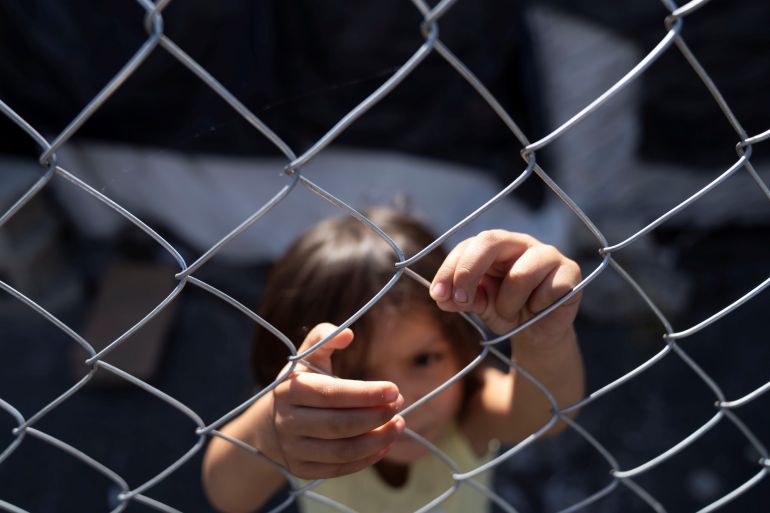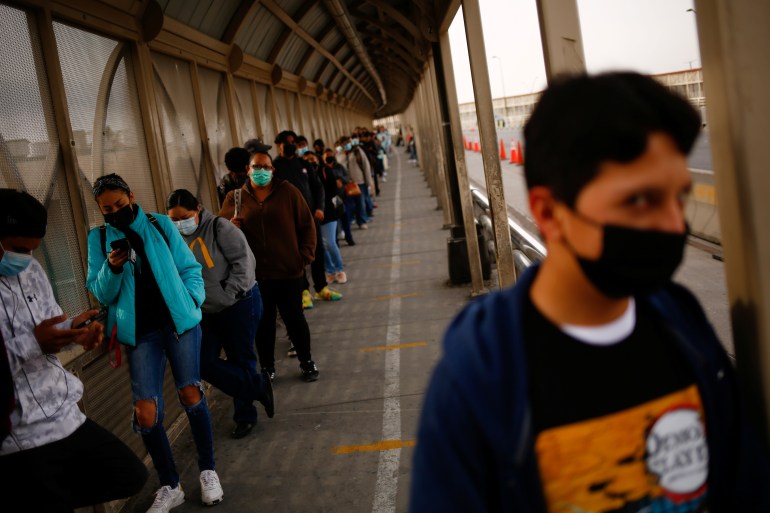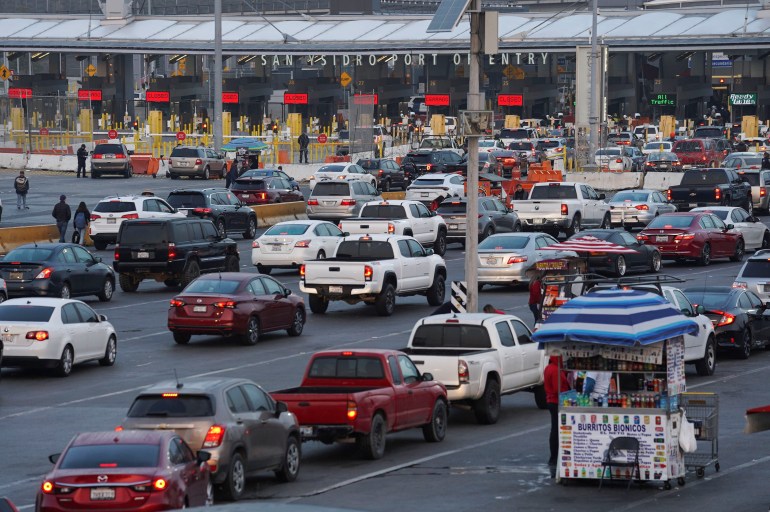At US-Mexico border, asylum seekers maintain hope amid hardships
The US reopened its borders this week to non-essential travellers, but most asylum seekers continue to be turned away.

Maria fled violent drug gangs in Mexico’s Michoacan state with just three changes of clothes.
The 38-year-old travelled 2,500km (1,500 miles) to the edge of the country, where she, her husband, two young children, and other family members have been waiting for a chance to claim asylum in the United States.
Keep reading
list of 3 itemsUS rights groups petition for a stop to asylum seeker expulsions
US plans to reinstate Trump-era ‘Remain in Mexico’ asylum policy
Now that the US-Mexico border has reopened, she says she has hope of being let through.
“We came to get away from organised crime, not because we are criminals,” Maria, who requested to withhold her real name, told the AFP news agency this week from a makeshift camp in the Mexican city of Tijuana.
Maria – who says her family was threatened after her eldest son was recruited into a criminal gang last year – is part of a record wave of Central and South Americans who journeyed north towards the US over the last year.
Makeshift camps house hundreds along the US-Mexico border, where US authorities this fiscal year detained a record-high 1.7 million migrants trying to enter the country.

The migrants say they were forced to flee their homelands amid chronic unemployment, gang violence, economic crises worsened by the pandemic, and the devastation wrought by recent storms, among other factors.
The arrivals have heaped pressure on the administration of US President Joe Biden, who had promised to take a more humane approach to immigration than his predecessor, Donald Trump, and to reverse some of Trump’s most hardline policies.
But Biden, who took office in January, has maintained a Trump-era policy that allows the US to expel most asylum seekers who arrive at the southern border back to Mexico or to their countries of origin.
The Title 42 policy, which has garnered widespread criticism from immigrant advocates who say it is unlawful, cites concerns over the potential spread of COVID-19 to deny most asylum seekers the chance to apply for protection in the US.
It remains in place even as the US on Monday reopened its border with Mexico to nonessential travel following a 20-month closure due to the pandemic.

At another makeshift border camp in Mexico known as El Chaparral, dozens of children have been sleeping on the floor inside flimsy tents as they wait for a chance to apply for asylum in the US with their families.
Nearly 770 people currently live at the migrant camp, according to a recent census conducted by the Mexican border city of Tijuana, and 40 percent of them are minors. Some of the children at El Chaparral, which is fenced-in and controlled by police, were born in the US.
While that means the children automatically acquire American citizenship, many said they left the country when their undocumented parents were deported. The families have travelled back through Mexico to try to return to the US.
“I just want everything to be okay, for my mom to have a home. I want to go to the United States, but with my mom,” a girl named Evelyn, whose Mexican mother showed a birth certificate stating she was born in Los Angeles, told the Reuters news agency.
“My sister and I have [US] papers but when my dad had to come here, my mom brought all of us,” said Evelyn, 10. “She cries a lot because they don’t have money to feed us.”
Migrant rights groups have said migrants and asylum seekers faced myriad threats in the Mexican border towns where they are waiting to enter the US, saying in an April report that hundreds of acts of violence had been reported since Biden took office.
“Asylum seekers turned back to Mexico are being kidnapped, raped and assaulted,” Kennji Kizuka, associate director of research and analysis for refugee protection at Human Rights First, said at the time. Black migrants and asylum seekers, as well as members of the LGBTQ community, were particularly at risk of violence, the groups said.
Meanwhile, back at El Chaparral, Pedro, a 15-year-old migrant, has a birth certificate showing he was born in Los Angeles, and said his four brothers were, too. His mother brought them back to her native Mexico three months ago when his father was deported.
He now cleans cars in Tijuana using a small rag, earning whatever people are willing to give. “I’ve never worked before, but I’m doing it to help my mom,” he said.